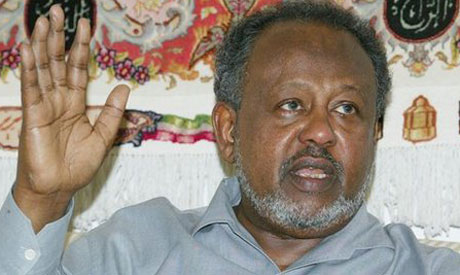Djibouti goes to the polls Friday with President Guelleh expected to secure a third term amid an opposition boycott, even after the biggest protests in more than 30 years
AFP , Wednesday 6 Apr 2011

Djibouti's President
Voters in the tiny but strategically placed Horn of Africa country will have a choice of President Guelleh or his lone challenger, former Constitutional Council head Mohamed Warsama Ragueh, when polls open at 6:00 am (0300 GMT). The main opposition Union for Democratic Change and Union of Democratic Movements are boycotting after they failed to find a joint candidate and because they dispute the independence of the election authority.
They have also slammed parliament's decision last year to change the constitution to enable 63-year-old Guelleh to run for a third term after being in power since 1999.
The ex-French colony, home to the only US military base in Africa, was rocked in February by its largest street protests since independence in 1977 when thousands of youths took to the streets demanding Guelleh, "the dictator", quit.
The demonstrations -- which came as the Arab world was gripped by a wave of uprisings against veteran rulers -- degenerated into violent clashes with security forces that left at least two people dead, according to officials.
They came a week after protests toppled Egypt's long-time leader Hosni Mubarak on February 11, with Tunisia's leader falling in a similar revolt the previous month.
Guelleh's regime retaliated by turning up the pressure on the opposition, taking in opposition and civil society leaders for questioning. In early March it expelled US good governance nongovernment group Democracy International.
The round-faced Guelleh, known by his initials IOG, insists that the mandate he is likely to secure on Friday will be his last but the opposition has levelled charges of "life presidency".
Election-day turnout figures will be a big test of public opinion.
Polling stations are due to be open for 12 hours, closing at 6:00 pm, with the results due the following day, on Saturday.
About 150,000 people are eligible to vote in a country of around 860,000 inhabitants, more than half of whom live in the capital.
The winner will get five years at the head of a largely desert country that is small in size -- about that of Macedonia in Europe -- but has a significant role on the international scene.
Guelleh was quick to benefit from his country's strategic location after the September 11, 2001 attacks on the United States, with Djibouti becoming the cornerstone of the US anti-terrorism strategy in the Horn of Africa.
Situated on one of the world's busiest shipping routes where the Red Sea joins the Gulf of Aden, the country hosts the only US military base in Africa and the largest overseas French army base.
It will soon also be home to a Japanese base and is a key player in fight against Somali piracy in the Indian Ocean.
The foreign military presence gives a boost to the country's economy which is largely dependent on Djibouti's port, a gateway into landlocked Ethiopia.
Guelleh was the sole candidate in the previous presidential election in 2006, also boycotted by the opposition which was also absent from the parliamentary elections of 2008.

No comments:
Post a Comment